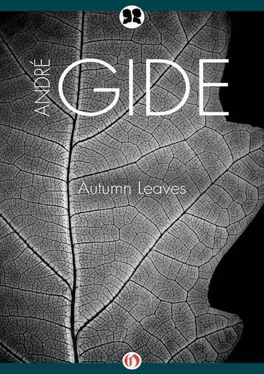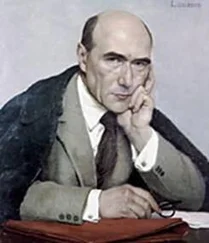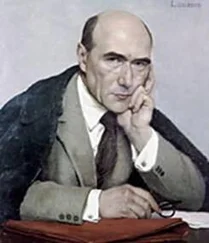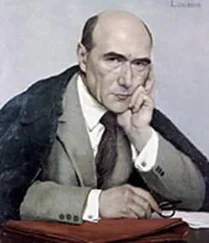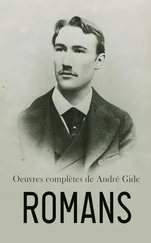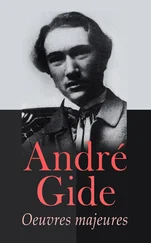In whatever direction I turn my eyes,
I see only misfortunes that condemn that God.
I find more consolation in considering God as an invention, a creation of man, that man composes little by little, tends to form more and more, by means of his intelligence and virtue. It is in Him that creation has its end, its aim, and not from Him that it emanates. And as time does not exist for the Eternal, that amounts to the same thing, for Him.
He. — It seems to me Renan said just about that.
I. — Oh! don’t interrupt me, I beg you! I have enough trouble already following my thoughts … Where was I?… Oh, yes. Faith. And notice that for them, the believers, nothing but that counts. A life devoted to search for the truth is nothing, for the only truth, for them, is that Truth that one “would not search for if one had not already found it.” And that Truth, all found, is sufficient for everything, suffices to cover every life of dissipation and error.
He. — It is true also that belief in that Truth brings about a betterment in the life.
I. — Or at least should bring it about. But what is the use of quibbling about it? The very property of dogma is to be indisputable. So let’s not dispute it.
He. — And yet you admit the teaching of the Gospels.
I. — With all my heart, yes; but outside of (apart from) Faith. Now, if I should put every teaching of Christ into practice, conform my life to it, in the eyes of the believer, none of all that would count without Faith.
He. — You are wrong. All that retains its importance. I fear you have been misinformed. You are judging from your old memories. The Church of to-day shows itself ready to recognize, even in unbelievers, good habits and good will, every effort toward the good and the true. Deploring only that these efforts are not offered to the Lord, the Church to-day is much more disposed to pity than to condemn.
I. — Why yes; I am not ignorant of the fact that the Church has very charitably and wisely withdrawn its frontal attack. It would no longer condemn Galileo, good heavens! It does not stop, nor will it stop in its progress backwards. L’Histoire Universelle of Bossuet makes even priests smile to-day. Step by step, the Church is losing ground, beats a retreat, yields.…
He. — And in this withdrawal orthodoxy is strengthened.
I. — My mind refuses to submit itself to any orthodoxy whatever.
He. — And yet you recognize the excellency of the Gospel precepts. Their finest putting in practice loses all meaning without Faith.
I. — Say that they take on a different one, and one for which I have a preference.
He. — Yes, through pride.
I. — I was expecting that word. Believers owe it to themselves to give a disparaging interpretation to everything great and noble and fine in independence.
He. — Independence! Ah! the time has come to talk about it! Yet you recognize that to-day it is important to group, organize, bring under the yoke in order to employ, to subject, to make useful.…
I. — Finish it; say, to administer the oath.… One can always find excellent motives for repudiating reason and keeping man from thinking. Unite wills, that’s all very well; nothing great is accomplished without submission and discipline. But, through a forced devotion, to prevent reason from exercising itself, to regulate thought on order, that can lead only to a general stupefying. Amissa virtute pariter ac libertate, with no one left to be aware of it, no one to suffer from it; for inactivity of the mind is like that of the body, and every other form of sloth; first one accepts grumblingly, then the mind quickly takes its ease in an outwardly devotional acquiescence, and that’s just where the danger lies; Invisa primo desidia, postremo amatur.
He. — What in the world has gotten you to quoting so much Latin?
I. — That’s because, for the past few days, I have been buried in Tacitus.
He. — Do you read him easily?
I. — More easily than I would have thought; but not without a translation on the opposite page, and with inexpressible satisfaction. Without doubt I am delighted with the impulsive manner of a Stendhal, whose idea one seems always to be surprising on getting out of bed, before making one’s toilet. I do not like thoughts which are made up and decked out, but those that are concentrated and compact. Tacitus’ sentence is taut. It is his Life of Agricola that I am reading, and from the beginning I was conquered. What authority! What gravity! What fervor! How pleased I am, more than by ease or grace, with that austere, savage asperity! I take this book with me; I read as I walk; I roll under my tongue without exhausting all the bitter sap, some of the vigorous sentences by which my will is stiffened: “With the voice we should have lost our memory, if it had been as easy to forget as to remain silent” … Si tam in nostra potestate esset oblivisci quam tacere. What precedes it is equally fine. Reread it.
He. — You read a great deal.
I. — I have never read so much, nor so well; with a sort of eagerness as in my youth and which, when I think of my age, appears to me a little ridiculous; but I can’t do anything about it; I think as little as. possible about my age, and when I think of it, it is to say to myself: hurry up. But this digression carries us.…
He. — Not at all. It leads us back to God. Everything leads the attentive soul back to God. Why don’t you recognize in the “hurry up” His Call? “Hurry up and give me your heart, love Me.”
I. — I am going to try to explain myself. Not so much to explain to you as to explain to myself the point at which my thought has slowly arrived almost in spite of myself.
There can be no question of two Gods. But I take care not to confuse, under this name of God, two very different things, different to the point of opposing each other. On one hand, the whole of Cosmos and the natural laws that govern it; matter and forces, energies; that is the role of Zeus; and that can be called God, but on taking out of the word all personal meaning and morality. On the other hand, the fascicles of every human effort toward the good and the beautiful; the slow mastery of brute forces and their putting into service in order to realize the good and beautiful on earth; that is the role of Prometheus; and Christ’s role, too; it is the unfolding of man, and all the virtues have part in it. But this God does not inhabit nature at all; he is created by man, or, if you prefer, it is through man that he creates himself; and every effort to exteriorize him by prayer remains futile. It was with him that Christ joined; but it is to the other one he addresses himself when, dying, he utters his despairing cry: “My God, why hast thou forsaken me?…”
He. — In order that “all be accomplished,” says the believer.
I. — But I who do not believe see in it only a tragic misapprehension. There is no desertion there because there was never an understanding; because the god of natural forces has no ears and remains indifferent to human sufferings, either in attaching Prometheus to the Caucasus, or in nailing Christ to the cross.
He. — Allow me: it was not natural forces that crucified Christ; it was man’s malignity.
I. — The God whom Christ represents and incarnates, the God-Virtue, must fight at the same time against Zeus and man’s malignity. That last word of Christ (the only one of the seven words of the Crucified reported by two Evangelists, the simple apostles Matthew and Mark, who report only that word) keeps me from confusing Christ with God, if all the rest had not already warned me. How can one not see, in that tragic word, not a letting go, a treachery on God’s part, but this: that Christ, believing and making others believe that he was one with God, was mistaken and deceived us; that the One he called “my Father” had never recognized him for Son, that the God he represented, that he himself, was only, as he sometimes says, “the Son of Man?” It is that God only whom I am able and wish to adore.
Читать дальше
